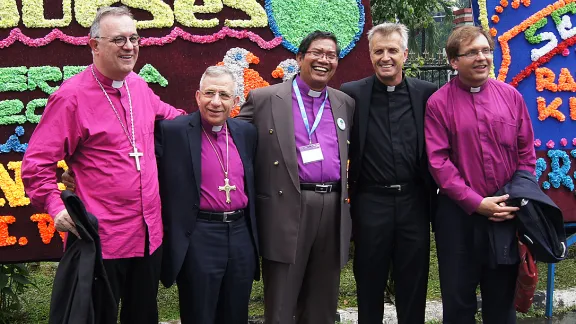
Part of the communion: Bishop Langsung M Sitorus (center) with Bishop Dr Frank O. July, LWF President Bishop Dr Munib A. Younan, LWF General Secretary Rev. Martin Junge and Bishop Dr Tamás Fabiny. Photo: LWF/ C. Kästner
“The Council Meeting Has Empowered Us”
(LWI) – Member churches of the Lutheran World Federation (LWF) in Indonesia have been living in a multi-religious society for decades. At its meeting, the LWF Council issued a statement, joining and supporting Indonesian member churches in their continuing dialogue with different religious groups. In an interview with Lutheran World Information (LWI), Bishop Langsung M. Sitorus, chair of the LWF National Committee in Indonesia and Bishop of The Indonesian Christian Church (Huria Kristen Indonesia, HKI) speaks about the challenges Indonesian churches are facing today and the power of being part of the Lutheran communion.
What are your impressions of the 2014 meeting of the LWF Council in your country?
We prayed that the meeting could take place, and when it happened it was a blessing. We thank everybody who helped with prayers and donations. I think every church member contributed a small part to finance this meeting. We learned and feel strongly that all the Lutherans worldwide unite in communion, in belief and in the responsibility for a good neighborhood between followers of different religions. This meeting has empowered Lutherans in Indonesia.
What does it mean to be Lutheran in Indonesia?
We received the word of Christ, we received salvation and now have to share His word by doing diakonia – serve our neighbors. Through this meeting we learned that it is better to do diakonia together than alone. We are powerful when united.
How do you experience being part of the Lutheran communion?
We feel that we are part of a very great family which is very strong in faith and strong in caring for the world and for humankind. We feel that the churches in Indonesia are not alone: We have many brothers and sisters.
What challenges do Lutherans in Indonesia face today?
Our greatest challenge are the radical groups. They are in fact very small, but they work hard to close churches. They do not represent the majority of Indonesians. That’s why we still have hope to build tolerance in society. We live in a country where the majority are Muslims. They have a missionary religion, and we are also a church in mission. We try to do this in peace and without confronting each other. I see ourselves like people in a market. People will come where they find the better goods. So our task is to improve ourselves.
Our second challenge is poverty. We are training people to improve their economic situation without destroying the environment. Many of our members are small farmers. Sometimes they cut the trees and destroy the tropical forest to gain farmland and make more money. We must help the farmers to stop this and give them alternatives to preserve nature. We see it as our task to support organic farming. Our churches also give microcredits to help poor people. But the poverty also unites us. I hope that a time will come to unite our 13 Indonesian member churches into one, or maybe three – according to the languages we would then have an Indonesian, a Batak and a Nias church. But I think it is time to unite.
We also see how charismatic movements are drawing on our members. We stand strong with Lutheran teachings. Over the past years we have reformed and transformed church life and worship life. Therefore today more people seek to be Lutheran. They understand that it is good to be in God’s grace.
Where do you see the treasures of your church?
Our churches can share Lutheran teachings about democracy and about the two kingdoms Martin Luther describes. We can envision a society where all religions sit side by side. We can share our teachings about peace and tolerance.
Council 2014 News | Council 2014 Blog | Council 2014 Documents | Council 2014 Photos


